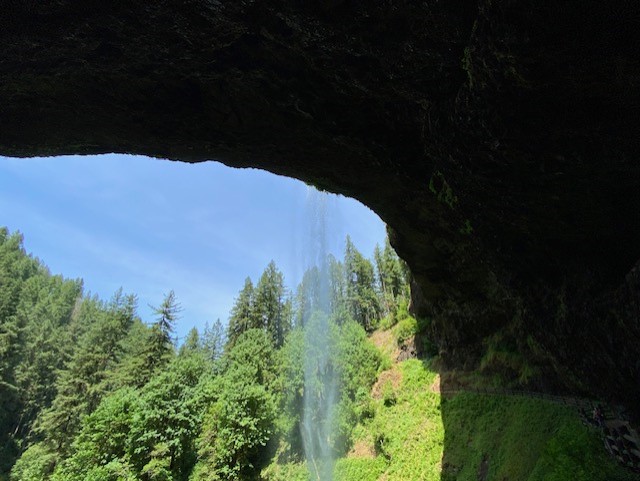
When my kids were younger, we usually had an annual Oregon State Parks parking permit, purchased in the hopes of making planned trips to state parks.
That’s not generally how it shook out. Other things constantly intruded, or we just couldn’t plan that far ahead—we aren’t a family of planners; we’re more spur-of-the-moment. This made the parks pass even more valuable because we could go to any park on the odd Saturday that the weather turned out unexpectedly beautiful, and we got the urge to leave the house for some legit recreation.
My most cherished reason for having a parks pass in those days was different, though: the Unplanned Child Decompression Necessity. I’m talking about those times when you have to go to some family thing 2 hours away, and an hour in, it’s obvious the kids are going to lose it if they’re stuck in the car one more minute, so you have to make an unscheduled stop to let them work their issues out. Stopping at a park was one of two options when this needed to be struck, and the other one involved spending money on something like ice cream or French fries.
And, of course, if you have a state parks pass and you suddenly need to visit a restroom, it’s nice to be able to go into any garden, bypassing the pay station altogether, which is one reason why we still have an annual pass, even though the kids are older and generally have other plans that rarely involve us.
There are many other reasons to purchase a park pass, and I’ll give you a run-down below after I get into the nitty-gritty.
An Oregon State Parks parking permit is just that—a permit to park in the parks that have a day-use fee. To be clear, the parking fee is the day-use fee. The pass costs $30 per year (i.e., a 12-month pass) per vehicle, and you can switch it between vehicles. 24-month passes are a bargain at $50. It’s not necessary to visit a state park to get a pass, either. They’re available at places like REI and Cabela’s, so you can just pick one up the next time you’re buying a case of freeze-dried stroganoff for camping. Speaking of camping, those fees aren’t covered by the annual pass.
Since we have an annual parking pass, we tend to just stop at an interesting-looking park if we’re on a road trip. Places we might not have bothered with otherwise or even noticed. For the most part, those places have been unexpectedly interesting. That’s the best argument for buying the pass (aside from the ability to find a restroom in a plethora of places that aren’t fast-food restaurants, gas stations, or rest areas).
Tangentially, those random places we’ve stopped simply because we could get in for free and we had the time were in remote areas, like the Deschutes River State Recreation Area just off of I-84, east of The Dalles.
Okay, full disclosure, that stop started as a bathroom hunt. But let me redirect your attention to the term “state recreation area.” It’s not a state park, per se, but it’s still covered by the pass, as are state historic areas, state natural areas, and state scenic sites (most of the viewpoints are free, but there are scenic trails that require fees to park).
For all you planners out there, let me give you a few extra reasons to visit state parks (and buy a pass). By “extra reasons,” I mean the ones that aren’t obvious, like hiking, swimming, or seeing amazing scenery. I’ll start with a new one for me: disc golf. There are disc golf courses everywhere in the state parks system, it turns out. I’ve never played disc golf myself, but I’ve met a few devotees, and they were pretty darned enthusiastic about it. There are tons of sites with tips on how to teach it to kids, such as this one.
Some other activities available at parks that might not immediately spring to mind are windsurfing access in the Columbia Gorge, kayaking, and other non-motorized boating—some parks have equipment for rent, or even give lessons—including kayaking tours, guided nature hikes, fishing, visiting tide pools, star parties (i.e., big gatherings for notable celestial events), and the big one for parents: the Junior Ranger program.
Parents in the Portland area can bring their kids to Tryon Creek State Park on Saturdays throughout the summer and help them complete a booklet and scavenger hunt to become certified Junior Rangers. There are other Junior Ranger programs at places such as Silver Falls State Park. Both Tryon Creek and Silver Falls have parking fees. For information on scheduled sessions, visit the events calendar.
All right, I’ll start winding up my one-woman PR campaign by pointing out the most obvious reason to get a state parks pass—many unique sites in Oregon (and Washington, for that matter, which also sells a pass) are designated state parks. There are historical museums and sites such as those found at Fort Stevens, Champoeg, and Collier Memorial State Parks. There are incredible landscapes and geological formations you can visit, such as Smith Rock and Silver Falls. There are parks with special events not found elsewhere, such as the Shore Acres Holiday Lights. I’m sure I left out myriad other reasons. I suggest looking at the state parks website if you need more convincing.
This is probably the point where I should note that I didn’t subject you to all the reasons to get an America the Beautiful Pass, which allows you and your family free entry into any National Park and many, many other federally managed areas for a 12-month period for only $80. Not to mention all the other recreation pass options.
Hopefully, that’s enough info, because I have to go. I have a (free!) guided nature walk to attend at Silver Falls State Park.
